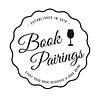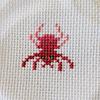Take a photo of a barcode or cover
I really enjoyed this book: poignant with relate-able characters at a scarily appropriate cultural time for this topic. It made me feel feelings and think thoughts and I couldn't put it down.
Red Clocks is a masterful, speculative narrative about a world in which abortion is made illegal. Although much less dystopian than I’d anticipated, I found this novel highly disturbing- perhaps more so, because I had to work to find the minute differences between this world, and my own.
In her expertly crafted prose, Zumas is skilled in her drawing of characters. The slow and measured way in which each of the 5 central characters are revealed to us is effective. Each moves with fluidity from alien to recognisable- by then end we can see elements of ourselves in each of them.
This novel really shines as a thematic discussion of womanhood. As the cover of my edition states, Zumas asks the question “what is a woman for?” For me, this novel was really about women, and their relationships with their bodies, and their selves, and the people with whom we form relationships. It’s about how these relationships change when the right to choose is stripped away. These are challenging questions to consider- especially when this reality doesn’t seem so impossible at all.
In her expertly crafted prose, Zumas is skilled in her drawing of characters. The slow and measured way in which each of the 5 central characters are revealed to us is effective. Each moves with fluidity from alien to recognisable- by then end we can see elements of ourselves in each of them.
This novel really shines as a thematic discussion of womanhood. As the cover of my edition states, Zumas asks the question “what is a woman for?” For me, this novel was really about women, and their relationships with their bodies, and their selves, and the people with whom we form relationships. It’s about how these relationships change when the right to choose is stripped away. These are challenging questions to consider- especially when this reality doesn’t seem so impossible at all.
Dare I say it, I believe this novel will make my Best of 2018 list. Despite a bit of a slow start, I loved this novel and didn’t want it to end. The novel is told from the differing perspectives of four women, although you could argue there are five. This made it feel disjointed at first until I got into a groove with it, but once I did I devoured this beauty.
The story is set in a small town in Oregon in the near-future where these four women live. The Personhood Amendment has made abortion and in-vitro fertilization illegal. As the story begins we also learn that a new bill is being passed that makes it impossible for unmarried people to adopt children. As these four women cope with these laws and motherhood or lack thereof we start to see how societal expectations shapes each of their lives. There’s Ro, an unmarried teacher and unpublished biographer, who is desperate to have a child while battling failed attempts at getting pregnant. Then there’s Mattie, a straight A high school student who accidently becomes pregnant and is desperate to have an illegal abortion. Then there’s Susan, a mother of two children and a wife to a man she no longer wants to be married to. And last but not least we have Gin, a “witch” who offers herbal cures to a myriad of women’s health problems, including abortions.
I loved how each character was so uniquely her own person. These seemingly different women end up crossing paths and have intertwined story arches as the novel progresses. The character development was wonderful and the story was moving, without being overly emotional. If you love a subtle dystopian or feminist fiction then you should read this novel asap.
The story is set in a small town in Oregon in the near-future where these four women live. The Personhood Amendment has made abortion and in-vitro fertilization illegal. As the story begins we also learn that a new bill is being passed that makes it impossible for unmarried people to adopt children. As these four women cope with these laws and motherhood or lack thereof we start to see how societal expectations shapes each of their lives. There’s Ro, an unmarried teacher and unpublished biographer, who is desperate to have a child while battling failed attempts at getting pregnant. Then there’s Mattie, a straight A high school student who accidently becomes pregnant and is desperate to have an illegal abortion. Then there’s Susan, a mother of two children and a wife to a man she no longer wants to be married to. And last but not least we have Gin, a “witch” who offers herbal cures to a myriad of women’s health problems, including abortions.
I loved how each character was so uniquely her own person. These seemingly different women end up crossing paths and have intertwined story arches as the novel progresses. The character development was wonderful and the story was moving, without being overly emotional. If you love a subtle dystopian or feminist fiction then you should read this novel asap.
Really really liked this one. I liked the way the characters were all related and involved, but also so separate, like they were just in each other's orbits. I liked the strong female presence even in a world where women's rights don't exist. The heartbreaks of each character are so real and well-written. I'll be thinking about this book for a long time.
3.75. I really wanted to love this book and while it didn’t sweep me away like other related titles, I think it’s a relevant read in today’s climate. I found the author’s style a little choppy at first but as I learned more about the characters, it all began to connect for me.
I was unsure what I was reading as I have stayed away from the features for this 'must-read' book on lists for 2018.
Getting an early copy from Harpercollins I was interested by the byline - 'Five Women one question What is a woman for?'
With the mad President in full effect the America in this novel has passed a law that all embryos have human right, any attempt to end, assist or organise a termination is illegal and girls as young as 13 are being charged with manslaughter or murder. If a woman miscarries she is responsible for full funeral costs by law. A harrowing insight.
We meet a female ice explorer in the 18th century; a wife unhappy in her marriage; a biographer unhappy about the two for every child condition that may stop her adopting a child; a daughter being young and frivilous; a mender with a history linked to witches.
Each have a part to play and at first each chapter helps you identify with each character. I found this a little bitty but I needed a good hour of reading to get into this.
I found myself thinking more about the book and its qualities after I was reading it. I am sure book groups will find much to debate on and am sure the media will have a lot of marmite reviews.
I liked it but was not overwhelmed with love for the characters.
Red Clocks has made me stop and think. Should certain rights we take for granted be taken away we would lose a lot of freedom.
Getting an early copy from Harpercollins I was interested by the byline - 'Five Women one question What is a woman for?'
With the mad President in full effect the America in this novel has passed a law that all embryos have human right, any attempt to end, assist or organise a termination is illegal and girls as young as 13 are being charged with manslaughter or murder. If a woman miscarries she is responsible for full funeral costs by law. A harrowing insight.
We meet a female ice explorer in the 18th century; a wife unhappy in her marriage; a biographer unhappy about the two for every child condition that may stop her adopting a child; a daughter being young and frivilous; a mender with a history linked to witches.
Each have a part to play and at first each chapter helps you identify with each character. I found this a little bitty but I needed a good hour of reading to get into this.
I found myself thinking more about the book and its qualities after I was reading it. I am sure book groups will find much to debate on and am sure the media will have a lot of marmite reviews.
I liked it but was not overwhelmed with love for the characters.
Red Clocks has made me stop and think. Should certain rights we take for granted be taken away we would lose a lot of freedom.
I really loved this book! It's set in a present-day America where abortion is illegal regardless of circumstances, where a law requiring adopted babies to have two parents is about to go into effect and where pregnancies started through IVF are no longer permissible.
It follows four women - Roberta (The Biographer), Gin (The Mender), Susan (The Wife), and Mattie (The Daughter) - and their lives as they navigate life in their small town.
It's beautiful and sad.
It follows four women - Roberta (The Biographer), Gin (The Mender), Susan (The Wife), and Mattie (The Daughter) - and their lives as they navigate life in their small town.
It's beautiful and sad.
LOVED this novel. Loved the characters, the writing, the important topic, the way it was nevertheless never too heavy, the way it felt original even though it is 'on trend'. An inspiration.
Didn’t know how to rate this book. Debated heavily between 3 and 4 stars. In many ways it is kind of brilliant but then there were parts I absolutely hated or still didn’t totally see the connection at the end of the book. But overall I really enjoyed it so went with 4 stars over 3.
Maybe my expectations were too high, given all the hype around this book. I love a good feminist dystopian story, and this one seemed particularly plausible, but I couldn’t get past the jerky, trying-too-hard-to-be-poetic language and the cliches within some of the female relationships.








